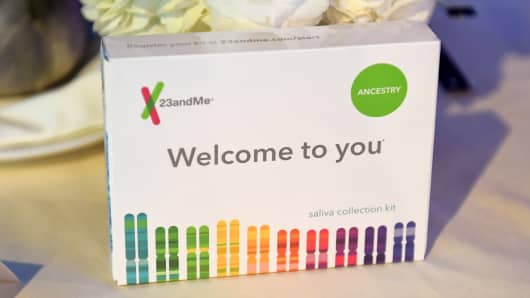One of the most compelling signs that consumers have a positive view of these companies is that a majority agree to let them share DNA with researcher partners. All of these companies make clear that they will not share your DNA with any third-party unless you explicitly consent to it, but as 23andMe data shows, the vast majority of consumers opt in — at 23andMe, more than 80 percent. Ancestry.com and Veritas do not provide data on the opt-in percentage.
23andMe provides consumers the choice of opting into research conducted on behalf of academic, nonprofit and industry organizations. They also offer an option to consent separately to specific disease studies in which their DNA is used in conjunction with for-profit drug companies, such as the Parkinson's disease research conducted with Genentech and the lupus and IBD research conducted with Pfizer.
"If customers don't consent, none of their data is shared," a 23andMe spokeswoman said.
More from CNBC Disruptor 50:
Consumers seem to have made the decision that altruism is the proper course of action: If their DNA can help find a cause of, or cure for, a disease, they want to be part of that process. But it also means that one day a drug company may be bringing a drug to market based, in part, on your DNA.
"People do think they are helping the world, helping society, even though they may not as an individual benefit," King said. "But if your DNA helps develop a drug for a pharmaceutical company, there is nothing governing what they do. It could be a drug they sell at a high profit but doesn't help the world become a better place."
Veritas Genetics CEO Mirza Cifric said what it learns from research becomes immediately available to consumers through updates to their own genome or publication that moves science forward. "Our primary interest is unlocking secrets that exist in the genome, not engaging pharmaceutical companies to develop drugs, although we see potential value in that," Cifric said.
Marcy Darnovsky, executive director at the Center for Genetics and Society, said this research process also means that data is shared with and passes through many partners, and in her opinion, no matter what the testing companies say, they can't ensure what those partners are doing with your DNA.
An Ancestry spokeswoman noted that the decision to share DNA for research is not irrevocable, and consumers can request to revoke that permission at any time through their account settings. But King isn't convinced: "Quitting one of these services isn't as simple as just clicking Delete. How do you verify that they've actually deleted your genetic profile or destroyed a physical sample?"

